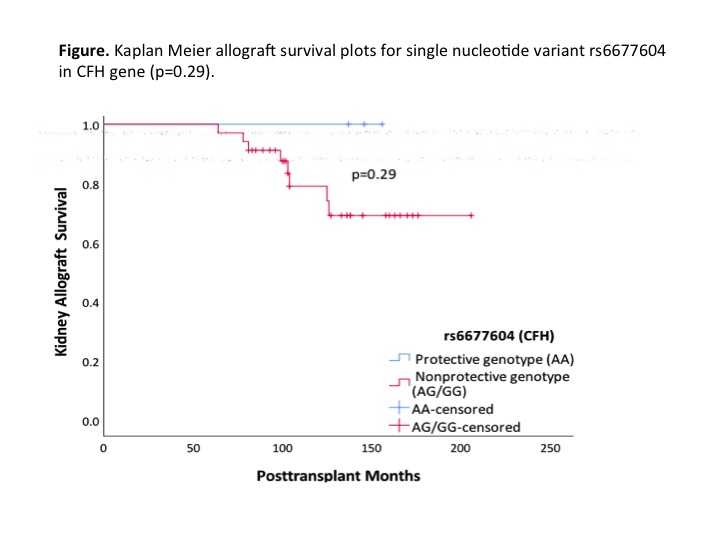Novel Biomarkers for Post-Transplant Recurrent IgA Nephropathy
1Division of Nephrology, Saint Louis University, Saint Louis, MO, 2Division of Nephrology, Istanbul Faculty of Medicine, Istanbul, Turkey, 3Department of Pathology, Istanbul Faculty of Medicine, Istanbul, Turkey, 4Center for Abdominal Transplantation, Saint Louis University, Saint Louis, MO, 5Department of Medical Biology, Istanbul Faculty of Medicine, Istanbul, Turkey
Meeting: 2020 American Transplant Congress
Abstract number: D-266
Keywords: Glomerulonephritis, Graft failure, Kidney transplantation
Session Information
Session Name: Poster Session D: Biomarkers, Immune Assessment and Clinical Outcomes
Session Type: Poster Session
Date: Saturday, May 30, 2020
Session Time: 3:15pm-4:00pm
 Presentation Time: 3:30pm-4:00pm
Presentation Time: 3:30pm-4:00pm
Location: Virtual
*Purpose: The aim of this study is to evaluate serum levels of galactose-deficient IgA1 (Gd-IgA1), advanced oxidation protein products (AOPP) and 4 tag single-nucleotide variants (tSNVs), which were recently found to be associated with risk of IgA Nephropathy (IgAN) as novel noninvasive biomarkers for posttransplant recurrence of IgAN.
*Methods: Thirty-seven kidney transplant (KTx) recipients [27 (73%) male; mean age 41±11; 33 (89%) living donor] with pre-KTx biopsy proven IgAN were analyzed at post-KTx median 42 (IQR 27.5-62) months. The relationship between serum Gd-IgA1, AOPP levels, genetic markers (tSNVs; rs3803800, rs2738048, rs2412971, rs6677604) in 4 IgAN-associated genes (TNFSF13, DEFA, HORMAD2, CFH, respectively) and recurrence risk of IgAN and allograft survival were evaluated.
*Results: Eighteen (48.6%) recipients developed recurrent IgAN at a median of 60.5 months after KTx. Serum Gd-IgA1 and AOPP levels of recurrent IgAN patients (7337±7942 ng/mL and 128±118 μmol/L) were not significantly different than nonrecurrent patients (6606±6719 ng/μL and 89±66 μmol/L) (p=0.76 and p=0.23, respectively). There were no significant associations between genetic markers and recurrence of IgAN. Serum Gd-IgA1 levels were only correlated with AOPP levels (r=0.58, p<0.001). During median follow up of 125 (IQR 97.5-151) months, the mean eGFR at last follow up was significantly lower in recurrent IgAN group (33.8±20.1 mL/min/1.73m2) as compared to nonrecurrent group (53.4±33.1 mL/min/1.73m2) (p=0.04). However, graft failure rate was not significantly different between recurrent [4 (22.2%)] and nonrecurrent [2 (8.7%)] groups (p=0.22). Serum Gd-IgA1 and AOPP levels did not differ between patients with functioning grafts and patients developed graft failure. None of the patients with genotype AA rs6677604 in CFH gene developed graft rejection or failure.
*Conclusions: Serum Gd-IgA1 and AOPP levels of KTx recipients with IgAN are not associated with allograft functions and predict post-KTx recurrence. Although genetic susceptibility loci for IgAN were not found to be associated with post-KTx recurrence and progression, further studies are needed to evaluate the effects of rs6677604 AA genotype in CFH gene on allograft functions.
To cite this abstract in AMA style:
Caliskan Y, Dirim B, Aksoy E, Ouseph R, Ozluk Y, Randall H, Oguz FSavran, Turkmen A, Sever MS, Lentine K. Novel Biomarkers for Post-Transplant Recurrent IgA Nephropathy [abstract]. Am J Transplant. 2020; 20 (suppl 3). https://atcmeetingabstracts.com/abstract/novel-biomarkers-for-post-transplant-recurrent-iga-nephropathy/. Accessed February 15, 2026.« Back to 2020 American Transplant Congress

